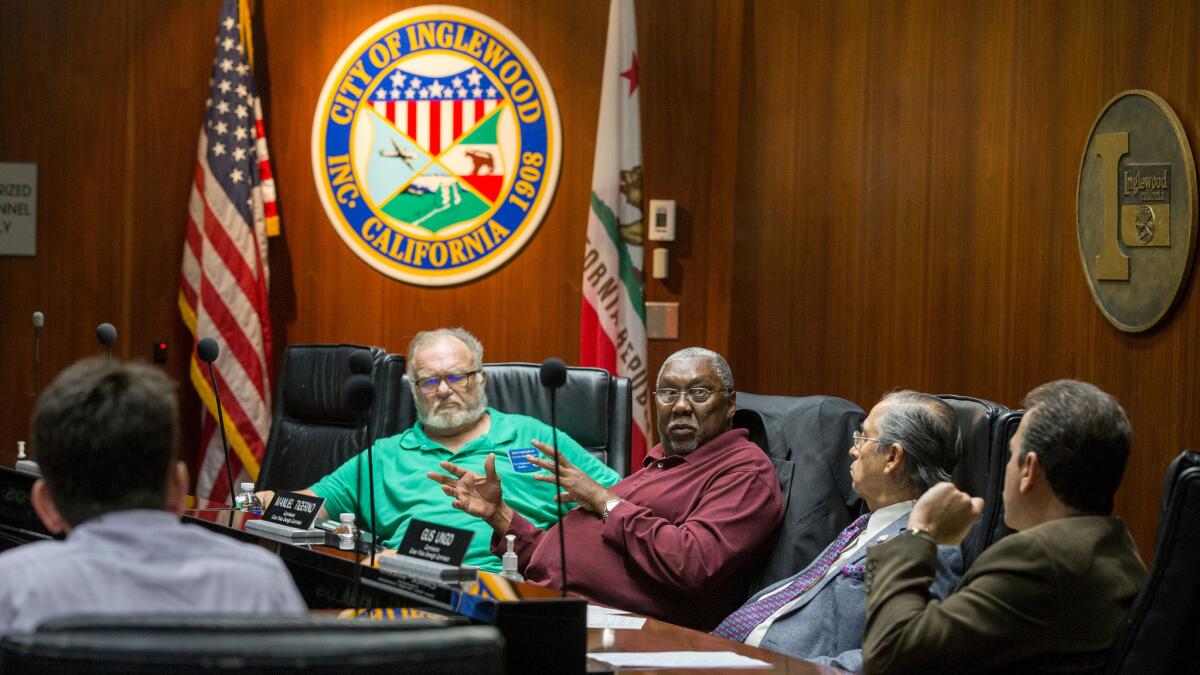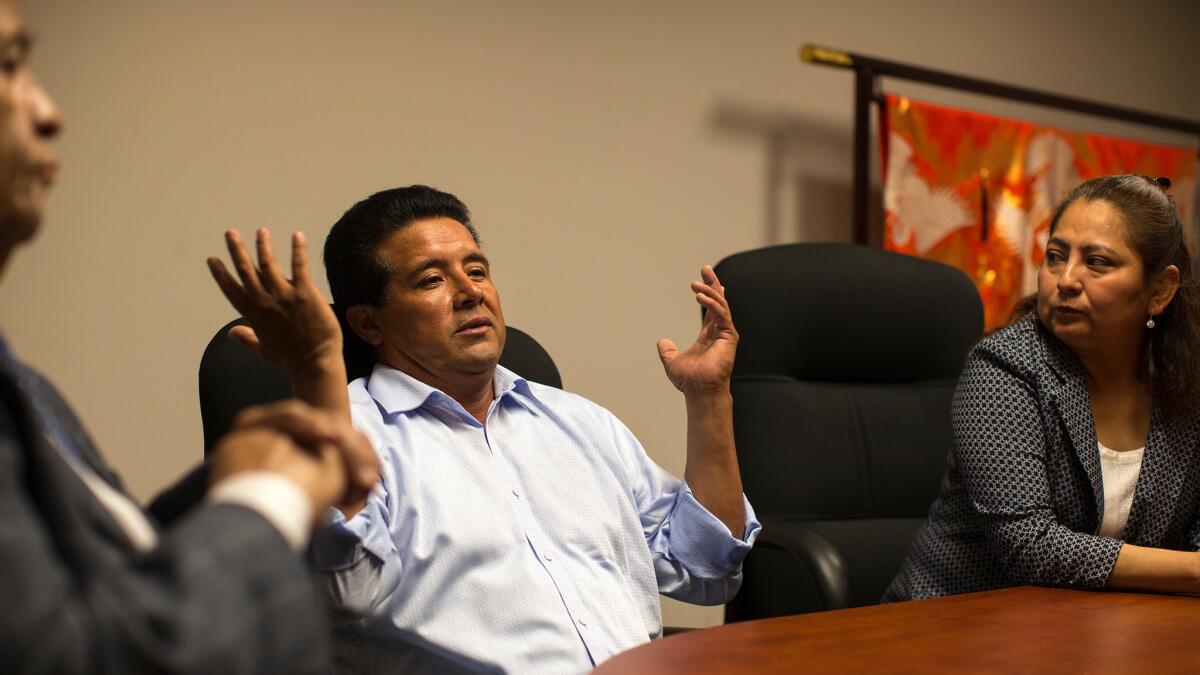A mother was fatally shot 13 times in Inglewood. But the police watchdog group has barely even met

Family members of Kisha Michael, a mother of three who was fatally shot 13 times by Inglewood Police Department officers, said they are desperate for answers surrounding her death. (Robert Gauthier / Los Angeles Times)
- Share via
Kisha Michael was sitting with her boyfriend in a Chevy Malibu idle in the middle of the road when Inglewood police approached the car.
It was just after 3 a.m., the couple appeared “unconscious” – and there was a gun on her lap, authorities said.
For the record:
12:30 p.m. Jan. 23, 2025The headline on an earlier version of this article referred to mother as an Inglewood resident. The shooting occurred in Inglewood but the victim was not a resident of the city.
Moments later, five officers unleashed a hail of gunfire. Thirteen bullets struck Michael in the head, neck and back, killing her. The driver, Marquintan Sandlin, was shot seven times and died at a hospital – the fatal bullet striking his head.
In the days, weeks and months after the Feb. 21 shooting, Inglewood police released little information about the shooting, including whether Michael or Sandlin ever reached for the gun or pointed it at officers.
Searching for answers, Michael’s twin sister, Trisha, went to the public body she thought could provide some: Inglewood’s Citizen Police Oversight Commission. But the monthly meeting that March was canceled — just like it was the next month, when she returned.
Inglewood officials created the commission in 2002 to monitor the police department following a controversial arrest in which an Inglewood officer was captured on video punching a handcuffed 16-year-old boy and slamming him onto the hood of a squad car. The idea was for a citizens’ panel to review the actions of officers in a public forum and allow residents to speak out and seek answers on an array of matters including discipline, police shootings and allegations of officer misconduct.
But it has not worked out that way.
The commission was supposed to hold monthly meetings. But the panel convenes infrequently, meeting only four times this year including a meeting held on Wednesday.

The panel was originally given broad powers to hold hearings on officer misconduct, subpoena witnesses and weigh in on possible officer punishment. But before commission members were even sworn in and held their first meeting, opposition from the police union resulted in laws that reduced the panel’s authority.
Now, the commission’s main job is to receive citizens’ complaints and pass them on to the police department, which investigates the claim.
Jan Williams, a local resident who follows city government, said she often goes to the commission meetings only to find they have been canceled due to a lack of a quorum. On May 11 — the first meeting in seven months — she criticized the commissioners for not convening more often.
This is “suppose to be our voice. I encourage you guys to meet more regularly,” she said.
The commission’s fading role in police oversight is all the more troubling to critics because the department continues to come under scrutiny.
For example, the commission had no role in reviewing the shooting of motorist Juan Jose Palma, whom the city recently paid $4.6 million to settle an excessive force lawsuit. Palma, now 46, was shot in the head by an officer during a 2012 traffic stop. The officer said he shot Palma because he refused commands to show his hands and appeared to be reaching behind his car seat for a weapon. No firearm was found in Palma’s SUV, but a baseball bat was found in the vehicle. Palma survived but suffered lasting brain damage.

Over the years, there have been calls to reform Inglewood’s civilian oversight. In 2008, after police in a span of four months fatally shot four men -- three of whom were unarmed — the U.S. Department of Justice launched a civil rights probe. Federal officials found significant flaws in the way Inglewood police oversaw use-of-force incidents and investigated complaints against officers.
The Justice Department proposed a host of reforms to help ease fear and distrust among city residents, including strengthening the police oversight commission. One of the six recommendations called for the police department to “actively solicit citizen participation and input in the review of its policies and procedures,” according to the report.
Michael Falkow, the assistant city manager who has served as the advisor for the panel since 2007, said the city’s elected leaders and commissioners have not had “a desire to change anything” with regard to how the police oversight panel functions.
At the May meeting, Falkow described the group’s limited purview.
The commission does not investigate allegations of police misconduct, he said. It can only make recommendations for discipline, but the final call belongs to the chief of police.
“To be very clear, the commission has no authority, the commission has no mechanism, the commission has no ability to discuss or oversee or even hear any cases of [or] related to officer involved shootings,” he told the two people in the audience.
By comparison, the five-member Los Angeles Police Commission overseeing the operation of the 10,000-officer force has broad authority and meets weekly. The panel sets LAPD policies and has an inspector general who investigates and audits the department on its behalf. In one of its most important roles, the board decides whether police shootings and other serious uses of force were appropriate.
At the Los Angeles County Sheriff’s Department, county officials has pushed for greater transparency and oversight of the more than 9,000 officers, appointing an inspector general to monitor the agency and creating a yet-to-be-appointed civilian oversight commission. The inspector general has the authority to investigate complaints made against officers and was recently granted access to confidential internal records on deputies’ uses of force and allegations of misconduct.
Sam Walker, a nationally recognized expert on civilian oversight of police, reviewed Inglewood’s minutes and described the commission as “absolutely worthless.”
“You look for some activity, something they are doing, that would help improve policing,” he said. “That’s the basic goal. There’s nothing there.”
Inglewood Mayor James T. Butts, a former Santa Monica police chief, would not comment about the role of the oversight commission. He also declined to release details of Kisha Michael’s shooting, saying only that it remains under investigation.
Jim Vaughan, the commission’s vice chairman, said the panel lacks the resources to conduct investigations like other commissions, but he’s proud of the work they do.
“We make sure what goes down, the people are notified,” Vaughan said. He said city officials and the police department assured him that when they conclude the investigation into Michael’s and Sandlin’s deaths, “we will make sure that the information is released to the public.”
The 11 unpaid members of the Citizen Police Oversight Commission are appointed by the mayor, City Council and police chief to represent the diverse concerns of the city, according to the group’s website. The residents who sit on the board are Vaughan, Manuel Tigerino, Gus Ungo, Lee A. Denmon, Carol Willis, David P. Stewart, Adrianne Sears, Matthew Chinichian, Linda Smith, Linda Reyes and Rita Hall.
The Times left voicemail messages for the other commissioners. Only four answered or returned calls. Denmon referred all questions to Falkow. Tigerino said he was told not to talk to the media. Willis said she had no comment, she was out of the country.
Following repeated questions from The Times about the role of the oversight panel, the commissioners placed a motion on the agenda for the scheduled Sept. 14 meeting to discuss changing the name of the group to the Citizen Public Safety Commission.
Like many others before, that meeting was canceled.
A special meeting was called two weeks later on Sept. 28. The seven commissioners in attendance unanimously voted to change the name, said Vaughan. The proposed panel, he said, is expected to be more visible and encompass more issues that affect residents beyond police oversight such as fire department, sidewalk and road safety, he said.
At the Wednesday meeting, the commissioners discussed a proposal to shrink thepanel to nine, remove commissioners who attended only sporadically, and give the panel a new focus, which included disaster preparedness, emergency response and school safety.
Denmon, the chairperson, said he wanted to build on the recent momentum.
“I am very, very proud of this commission,” he said. “Because what we have here tonight is we have three meetings in a row where we had a quorum.”
With only one resident in the audience, the commissioners applauded themselves.
::
For Trisha Michael, the commission’s inability to monitor police conduct or press for answers has been frustrating.
On the day of the shooting, she said, detectives arrived at the family’s home in Carson and said her sister was found dead in a car hours before. They did not say police had shot her.
The family learned from the news that police killed her. In the days after the shooting, Trisha Michael and the family watched Butts in a television interview describe the couple as having been “unconscious” in the car.
“‘Unconscious’ means a lot of things to me,” she said. “Did somebody knock them out? Were they drunk and fell asleep?”
The answers to those questions never came from Inglewood police, Trisha said. For months, the city refused to reveal the officers’ names, doing so only recently after a public records request from The Times. The five officers involved in the shooting were identified as Michael Jaen, Richard Parcella, Jason Cantrell, Sean Reidy and Andrew Cohen.
An autopsy report reviewed by The Times said only that there was an “unknown exchange” between police and the decedents prior to the shooting.
The autopsy report shows that 31-year-old Kisha Michael’s blood alcohol content was 0.185%, more than two times the legal blood alcohol content limit for driving. She sat in the passenger seat. Traces of methamphetamine, which the coroner’s report said can be used to treat attention deficit disorder and obesity, were found in her blood.
Sandlin’s blood alcohol content was 0.13%, over the legal driving limit. No drugs were found in the 32-year-old’s system.
According to court records, Kisha Michael had previous brushes with the law. She had pleaded guilty to selling cocaine in 2012 and no contest to larceny and petty larceny in 2015.
Sandlin pleaded guilty in 2009 to carrying an unregistered loaded firearm.
Trisha said her sister was a mother of three young boys who lived in Las Vegas. At the time of her death, she was looking for a job in L.A. to be closer to family.
“She was just happy for a new start,” Trisha said.
Her family has filed a civil lawsuit against the city of Inglewood alleging police used unreasonable deadly force. The guardian of Sandlin’s minor child also has sued, alleging police violated his civil rights.
For more California breaking news, follow @AngelJennings. She can also be reached at [email protected].
ALSO
First rain of the season snarls traffic, but record-breaking heat is on the way
Weather hampers efforts to rescue Eaton Canyon hikers trapped overnight
A $20-million plan to clean up MacArthur Park
More to Read
Sign up for Essential California
The most important California stories and recommendations in your inbox every morning.
You may occasionally receive promotional content from the Los Angeles Times.











